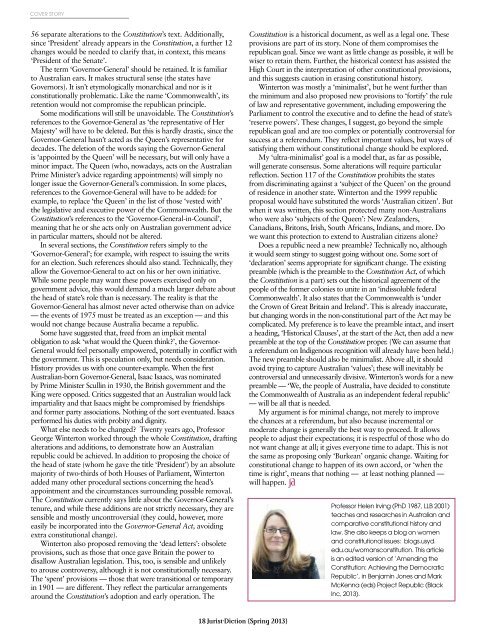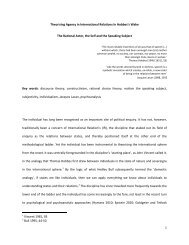PeoPLe, PoLicieS And PLebiSciteS: reforming the conStitution
PeoPLe, PoLicieS And PLebiSciteS: reforming the conStitution
PeoPLe, PoLicieS And PLebiSciteS: reforming the conStitution
Create successful ePaper yourself
Turn your PDF publications into a flip-book with our unique Google optimized e-Paper software.
COVER STORY<br />
feature<br />
56 separate alterations to <strong>the</strong> Constitution’s text. Additionally,<br />
since ‘President’ already appears in <strong>the</strong> Constitution, a fur<strong>the</strong>r 12<br />
changes would be needed to clarify that, in context, this means<br />
‘President of <strong>the</strong> Senate’.<br />
The term ‘Governor-General’ should be retained. It is familiar<br />
to Australian ears. It makes structural sense (<strong>the</strong> states have<br />
Governors). It isn’t etymologically monarchical and nor is it<br />
constitutionally problematic. Like <strong>the</strong> name ‘Commonwealth’, its<br />
retention would not compromise <strong>the</strong> republican principle.<br />
Some modifications will still be unavoidable. The Constitution’s<br />
references to <strong>the</strong> Governor-General as ‘<strong>the</strong> representative of Her<br />
Majesty’ will have to be deleted. But this is hardly drastic, since <strong>the</strong><br />
Governor-General hasn’t acted as <strong>the</strong> Queen’s representative for<br />
decades. The deletion of <strong>the</strong> words saying <strong>the</strong> Governor-General<br />
is ‘appointed by <strong>the</strong> Queen’ will be necessary, but will only have a<br />
minor impact. The Queen (who, nowadays, acts on <strong>the</strong> Australian<br />
Prime Minister’s advice regarding appointments) will simply no<br />
longer issue <strong>the</strong> Governor-General’s commission. In some places,<br />
references to <strong>the</strong> Governor-General will have to be added: for<br />
example, to replace ‘<strong>the</strong> Queen’ in <strong>the</strong> list of those ‘vested with’<br />
<strong>the</strong> legislative and executive power of <strong>the</strong> Commonwealth. But <strong>the</strong><br />
Constitution’s references to <strong>the</strong> ‘Governor-General-in-Council’,<br />
meaning that he or she acts only on Australian government advice<br />
in particular matters, should not be altered.<br />
In several sections, <strong>the</strong> Constitution refers simply to <strong>the</strong><br />
‘Governor-General’; for example, with respect to issuing <strong>the</strong> writs<br />
for an election. Such references should also stand. Technically, <strong>the</strong>y<br />
allow <strong>the</strong> Governor-General to act on his or her own initiative.<br />
While some people may want <strong>the</strong>se powers exercised only on<br />
government advice, this would demand a much larger debate about<br />
<strong>the</strong> head of state’s role than is necessary. The reality is that <strong>the</strong><br />
Governor-General has almost never acted o<strong>the</strong>rwise than on advice<br />
— <strong>the</strong> events of 1975 must be treated as an exception — and this<br />
would not change because Australia became a republic.<br />
Some have suggested that, freed from an implicit mental<br />
obligation to ask ‘what would <strong>the</strong> Queen think?’, <strong>the</strong> Governor-<br />
General would feel personally empowered, potentially in conflict with<br />
<strong>the</strong> government. This is speculation only, but needs consideration.<br />
History provides us with one counter-example. When <strong>the</strong> first<br />
Australian-born Governor-General, Isaac Isaacs, was nominated<br />
by Prime Minister Scullin in 1930, <strong>the</strong> British government and <strong>the</strong><br />
King were opposed. Critics suggested that an Australian would lack<br />
impartiality and that Isaacs might be compromised by friendships<br />
and former party associations. Nothing of <strong>the</strong> sort eventuated. Isaacs<br />
performed his duties with probity and dignity.<br />
What else needs to be changed? Twenty years ago, Professor<br />
George Winterton worked through <strong>the</strong> whole Constitution, drafting<br />
alterations and additions, to demonstrate how an Australian<br />
republic could be achieved. In addition to proposing <strong>the</strong> choice of<br />
<strong>the</strong> head of state (whom he gave <strong>the</strong> title ‘President’) by an absolute<br />
majority of two-thirds of both Houses of Parliament, Winterton<br />
added many o<strong>the</strong>r procedural sections concerning <strong>the</strong> head’s<br />
appointment and <strong>the</strong> circumstances surrounding possible removal.<br />
The Constitution currently says little about <strong>the</strong> Governor-General’s<br />
tenure, and while <strong>the</strong>se additions are not strictly necessary, <strong>the</strong>y are<br />
sensible and mostly uncontroversial (<strong>the</strong>y could, however, more<br />
easily be incorporated into <strong>the</strong> Governor-General Act, avoiding<br />
extra constitutional change).<br />
Winterton also proposed removing <strong>the</strong> ‘dead letters’: obsolete<br />
provisions, such as those that once gave Britain <strong>the</strong> power to<br />
disallow Australian legislation. This, too, is sensible and unlikely<br />
to arouse controversy, although it is not constitutionally necessary.<br />
The ‘spent’ provisions — those that were transitional or temporary<br />
in 1901 — are different. They reflect <strong>the</strong> particular arrangements<br />
around <strong>the</strong> Constitution’s adoption and early operation. The<br />
Constitution is a historical document, as well as a legal one. These<br />
provisions are part of its story. None of <strong>the</strong>m compromises <strong>the</strong><br />
republican goal. Since we want as little change as possible, it will be<br />
wiser to retain <strong>the</strong>m. Fur<strong>the</strong>r, <strong>the</strong> historical context has assisted <strong>the</strong><br />
High Court in <strong>the</strong> interpretation of o<strong>the</strong>r constitutional provisions,<br />
and this suggests caution in erasing constitutional history.<br />
Winterton was mostly a ‘minimalist’, but he went fur<strong>the</strong>r than<br />
<strong>the</strong> minimum and also proposed new provisions to ‘fortify’ <strong>the</strong> rule<br />
of law and representative government, including empowering <strong>the</strong><br />
Parliament to control <strong>the</strong> executive and to define <strong>the</strong> head of state’s<br />
‘reserve powers’. These changes, I suggest, go beyond <strong>the</strong> simple<br />
republican goal and are too complex or potentially controversial for<br />
success at a referendum. They reflect important values, but ways of<br />
satisfying <strong>the</strong>m without constitutional change should be explored.<br />
My ‘ultra-minimalist’ goal is a model that, as far as possible,<br />
will generate consensus. Some alterations will require particular<br />
reflection. Section 117 of <strong>the</strong> Constitution prohibits <strong>the</strong> states<br />
from discriminating against a ‘subject of <strong>the</strong> Queen’ on <strong>the</strong> ground<br />
of residence in ano<strong>the</strong>r state. Winterton and <strong>the</strong> 1999 republic<br />
proposal would have substituted <strong>the</strong> words ‘Australian citizen’. But<br />
when it was written, this section protected many non-Australians<br />
who were also ‘subjects of <strong>the</strong> Queen’: New Zealanders,<br />
Canadians, Britons, Irish, South Africans, Indians, and more. Do<br />
we want this protection to extend to Australian citizens alone?<br />
Does a republic need a new preamble? Technically no, although<br />
it would seem stingy to suggest going without one. Some sort of<br />
‘declaration’ seems appropriate for significant change. The existing<br />
preamble (which is <strong>the</strong> preamble to <strong>the</strong> Constitution Act, of which<br />
<strong>the</strong> Constitution is a part) sets out <strong>the</strong> historical agreement of <strong>the</strong><br />
people of <strong>the</strong> former colonies to unite in an ‘indissoluble federal<br />
Commonwealth’. It also states that <strong>the</strong> Commonwealth is ‘under<br />
<strong>the</strong> Crown of Great Britain and Ireland’. This is already inaccurate,<br />
but changing words in <strong>the</strong> non-constitutional part of <strong>the</strong> Act may be<br />
complicated. My preference is to leave <strong>the</strong> preamble intact, and insert<br />
a heading, ‘Historical Clauses’, at <strong>the</strong> start of <strong>the</strong> Act, <strong>the</strong>n add a new<br />
preamble at <strong>the</strong> top of <strong>the</strong> Constitution proper. (We can assume that<br />
a referendum on Indigenous recognition will already have been held.)<br />
The new preamble should also be minimalist. Above all, it should<br />
avoid trying to capture Australian ‘values’; <strong>the</strong>se will inevitably be<br />
controversial and unnecessarily divisive. Winterton’s words for a new<br />
preamble — ‘We, <strong>the</strong> people of Australia, have decided to constitute<br />
<strong>the</strong> Commonwealth of Australia as an independent federal republic’<br />
— will be all that is needed.<br />
My argument is for minimal change, not merely to improve<br />
<strong>the</strong> chances at a referendum, but also because incremental or<br />
moderate change is generally <strong>the</strong> best way to proceed. It allows<br />
people to adjust <strong>the</strong>ir expectations; it is respectful of those who do<br />
not want change at all; it gives everyone time to adapt. This is not<br />
<strong>the</strong> same as proposing only ‘Burkean’ organic change. Waiting for<br />
constitutional change to happen of its own accord, or ‘when <strong>the</strong><br />
time is right’, means that nothing — at least nothing planned —<br />
will happen.<br />
Professor Helen Irving (PhD 1987, LLB 2001)<br />
teaches and researches in Australian and<br />
comparative constitutional history and<br />
law. She also keeps a blog on women<br />
and constitutional issues: blogs.usyd.<br />
edu.au/womansconstitution. This article<br />
is an edited version of ‘Amending <strong>the</strong><br />
Constitution: Achieving <strong>the</strong> Democratic<br />
Republic’, in Benjamin Jones and Mark<br />
McKenna (eds) Project Republic (Black<br />
Inc, 2013).<br />
Local Government Referendum<br />
Yes, No and W hen?<br />
Australia has a pretty dismal record of constitutional reform, and<br />
no wonder, given how badly governments manage it.<br />
The proposed referendum on direct funding of local<br />
government is a case in point. The Commonwealth<br />
committed to holding it at an election on 14 September<br />
2013, passing <strong>the</strong> necessary legislation at <strong>the</strong> last possible minute<br />
to meet <strong>the</strong> constitutional requirement of a minimum period of<br />
two months before voting on <strong>the</strong> referendum can commence.<br />
But <strong>the</strong>n <strong>the</strong>re was a change of Prime Minister, <strong>the</strong> election date<br />
went out <strong>the</strong> window, uncertainty reigned on whe<strong>the</strong>r it would<br />
be held or not, and finally an election was announced for 7<br />
September — a week too early for <strong>the</strong> referendum to be held. If<br />
elected, <strong>the</strong> Rudd government said it would reconsider holding <strong>the</strong><br />
referendum later, while an Abbott government is uncommitted.<br />
Meanwhile, millions of dollars have been spent on a campaign for<br />
a referendum that may not happen at all.<br />
In <strong>the</strong> midst of this chaos, <strong>the</strong> Constitutional Reform Unit<br />
(CRU) at Sydney Law School attempted to bring some order<br />
and enlightenment. The CRU was established to support <strong>the</strong><br />
Anne Twomey<br />
Australian Federation Referendum Results 1899<br />
National Library of Australia, an14282068.<br />
constitutional reform process. Its role is to provide objective<br />
information to voters and opinion-makers, so that people can make<br />
a genuinely informed choice about constitutional reform. This is<br />
particularly important when much of <strong>the</strong> parliamentary debate<br />
and <strong>the</strong> official ‘Yes/No’ case are prepared by people advocating a<br />
particular result, who seek to persuade ra<strong>the</strong>r than to inform. In <strong>the</strong><br />
past, Yes/No cases have often been inaccurate, misleading, emotive<br />
and prejudicial — but rarely informative or fair.<br />
The CRU <strong>the</strong>refore prepared its own alternative Yes/No case,<br />
along with some FAQs to provide <strong>the</strong> necessary background<br />
information. It also published a detailed academic paper and<br />
bibliography for those who wanted to explore <strong>the</strong> issues in<br />
more detail. While <strong>the</strong> referendum was not held in September,<br />
<strong>the</strong> proposal is still alive and <strong>the</strong> work done will be available<br />
if and when it comes back on <strong>the</strong> public agenda. Following<br />
is a shortened version of <strong>the</strong> alternative Yes/No case. The full<br />
information is at: sydney.edu.au/law/cru/lgr.shtml<br />
18 Jurist·Diction {Spring 2013} Jurist·Diction {Spring 2013} 19
















